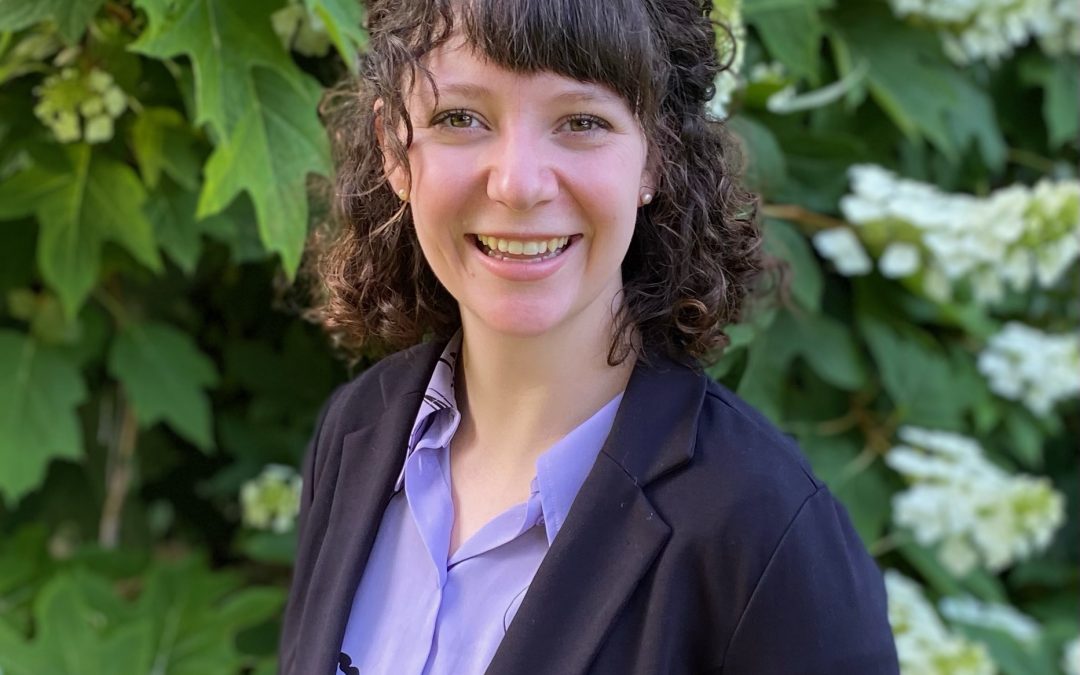
by Alondra Duncan-Belford | May 31, 2023 | Graduate Students, Internship Experiences
Hello! My name is Christina Grossen, and I am a recent Master’s graduate of Seton Hall University’s School of Diplomacy and International Relations. I was a research/data intern coding cultural heritage sites in Ukraine. While my internship was through the Smithsonian Cultural Rescue Initiative (SCRI), I worked directly with a team for the Cultural Heritage Monitoring Lab, built on a partnership between the Smithsonian and the Virginia Museum of Natural History. Fortunately, I found this internship through the Virtual Student Federal Service (VSFS) program offered by the US Department of State.
In the Fall of 2021, in Dr. Huddleston’s Causes of War class, I read Dr. Ron Hassner’s (2008) article, “To Halve and Hold: Conflicts over Sacred Space and the Problem with Indivisibility.” Dr. Hassner examines the causes and characteristics of conflict over sacred spaces, which opened my eyes to the vital role of cultural spaces in conflict. For many, cultural spaces are used as a unifying identity source, but for others, their destruction serves the same purpose. I wanted to explore the impact of cultural heritage sites as culture itself plays such a defining role in understanding peace and stability in conflict situations.
Unlike other internships and roles I have held in the past, I had a singular focus for SCRI – to code lists of cultural heritage sites. Every few weeks, I was given a new list of sites to go through and mine for information as deeply as possible for those sites. Sometimes the preliminary information contained names and geographic coordinates; other times, it simply included coordinates. Then using multiple online maps, I examined the site and look to find whether it is correctly listed, was used by the military, is lootable, and whether or not the site has a tourist function. Following critical information about the site, I determined whether it is listed on several tourist sites. I do this for every site assigned, and if questions or concerns arise, I reach out to my team lead and supervisor. Though I enjoy the investigative nature of the work, I sometimes find it challenging due to language barriers. The focus of this internship changes every year depending on the international climate. When I applied, I did not know I would look specifically at Ukraine. However, because of current world events, leaders and institutions must research current happenings and potential threats. Because I lack Russian and Ukrainian language knowledge, I had to problem-solve and locate helpful tools to alleviate some of my issues. This internship provided precise insight into what I am looking for in a career. While I enjoy the consistency of this work, I realized I desire more diversity in my workflow. Part of the reason I accepted this internship was to develop the data analytics skills I started exploring in my research methods class. This internship has afforded me that opportunity.
I recommend this internship to others interested in strengthening one specific skill. SCRI focuses on a niche area of study, and not everyone may enjoy the intense focus on coding and data analysis. However, because this internship is part of the VSFS, other departments offer training and informational sessions to help you develop additional skills and knowledge during the experience. I am thankful for the opportunity and what I learned from this internship!
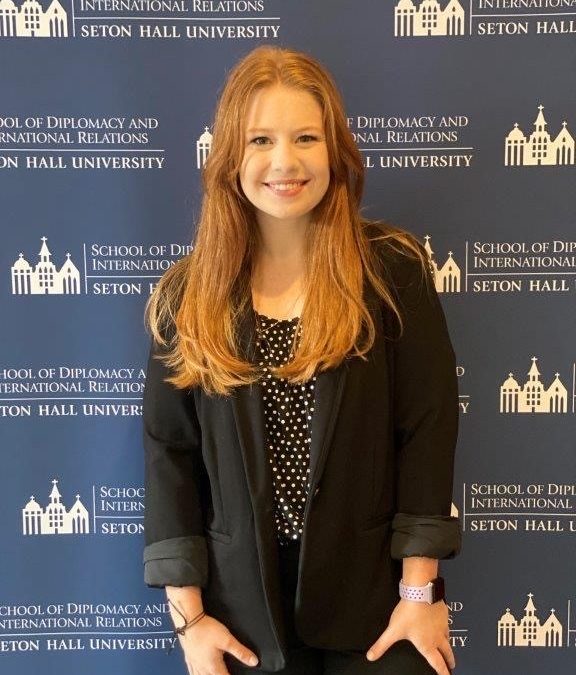
by Alondra Duncan-Belford | Apr 25, 2022 | Graduate Students, Internship Experiences
My name is Taylor Rodier, and I am a second-year graduate student at the School of Diplomacy. From the moment that I entered the graduate program at the School of Diplomacy, my goal has been to pursue a career at the US Department of State. I interned with two State Department bureaus: the Global Engagement Center and the Office of the Undersecretary for Civilian Security, Democracy, and Human Rights.
My position at the GEC was on the Iran team; my main responsibility was to track and synthesize the most current academic and think-tank research on Iranian disinformation tactics into a concise document that is then shared with over 700 individuals, both within the Federal Government and with our international government partners. I also served as one of two Intern Team Coordinators. My partner and I helped our supervisor track and peer-review the work of other threat teams, coordinate deadlines, and delegate special projects to other interns. One of my favorite projects with the GEC was to track Iranian disinformation regarding the Afghanistan withdrawal. Another one of my principal duties was to distill an entire article into a few lines and to provide a BLUF (bottom line up front) that summarizes the most crucial pieces of information into only one sentence. This sounds daunting, but luckily, I had received instruction on this process in my Diplomacy coursework which allowed me to be sufficient at this task early on.
My second internship in the Office of the Undersecretary for Civilian Security, Democracy, and Human Rights was very different from the GEC but immensely valuable in terms of professional experience. The Office of the Undersecretary leads Department efforts to prevent and counter threats to civilian security by assisting countries around the world to build more democratic and stable societies. I worked directly under the Under Secretary’s Chief of Staff, mostly on issues related to the resettlement of Afghan refugees. I synthesized information from cables and send daily updates to the Under Secretary so that she can stay informed about events on the ground in the Middle East. I also tracked trends and flag updates of notes, which helps to inform which projects and communications get priority attention from her. I was able to assist with information-sharing efforts between all eight offices that are actively being used to support the resettlement of Afghans.
Overall, my experience in the two bureaus has been the most valuable because I am getting to experience the State Department from the standpoint of both the Civil Service and Foreign Service. My work in the GEC is much more research-based, while my projects with the Under Secretary tend to be more task-oriented and responsive to daily events on the ground. I am incredibly grateful for these opportunities and the way they have helped me develop as a professional in this field. I am also endlessly grateful for the solid foundation that the School of Diplomacy provided me as it has been vital to my success in this role.
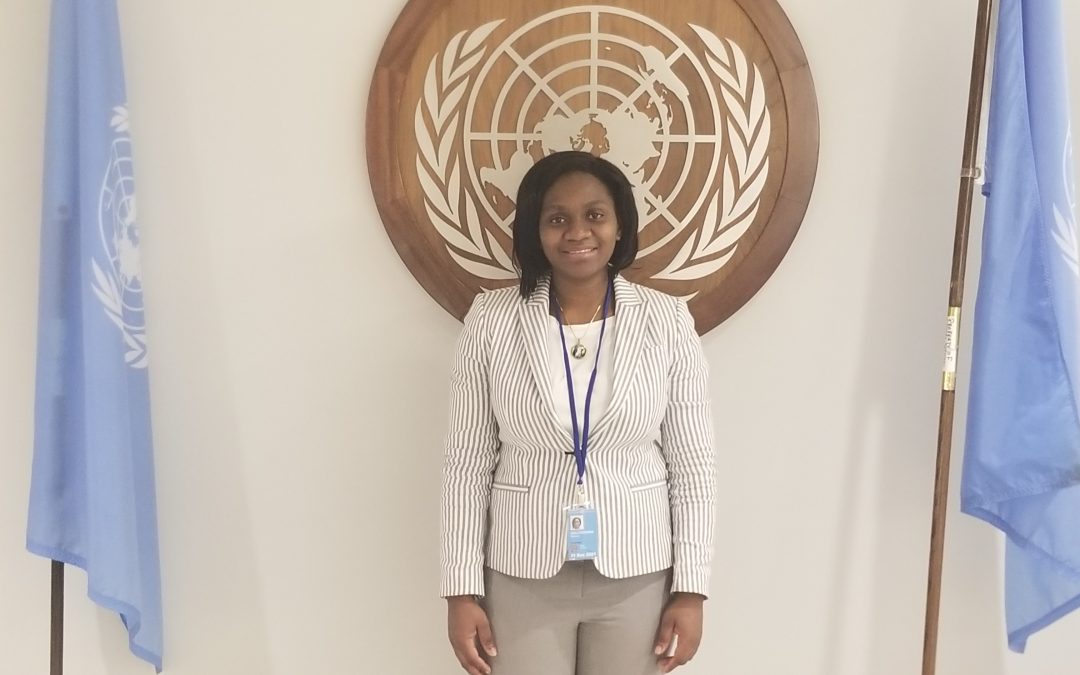
by Alondra Duncan-Belford | Jan 27, 2022 | Graduate Students, Internship Experiences
My name is Onyinye Bridget Ogili-Foreman and I am a second-year graduate student at The School of Diplomacy and International Relations. I worked as a Civil Affairs Officer intern at the United Nations Department of Peacekeeping Operations (UNDPKO) at the UN Headquarters in New York City. I always aspired to work with the UN because I have a passion for its duties, especially in areas of international security and peacekeeping in high-conflict regions. I became especially interested in the UN after taking courses that exposed me to the workings of the UN and its inherent role in international affairs.
My responsibilities included providing research assistance for policy documents and evaluating reports involving the work of different missions in the field. I also had the opportunity to work with U.N. experts to actually create policy documents. These documents will later be used in the policy prescriptions related to U.N. peacekeeping.
My internship is directly related to my coursework at the School of Diplomacy through the goals of the U.N. The goal of the U.N. is to promote diplomatic engagements between countries and create opportunities for them to find common ground on many issues that benefit from multilateral efforts. Many of the assignments I was given at the internship came naturally to me due to my previous coursework. Learning theories regarding international security and the roles of international organizations gave me material knowledge on most of the work and activities that I had the opportunity to engage in. I gained firsthand experience on how policy documents are drafted, as well as the consultation and negotiation processes needed, all of which sharpened my research, writing and analytical skills.
This internship reinforced my ambition to pursue a career with the UN and other opportunities linked to international security both in the private and public sector. My initial challenge was adjusting to work with a group of expert professionals who are more advanced both in education and experience, but I quickly learned to be humble and to ask questions. One of the most rewarding experiences was interacting with different stakeholders where I learned the nitty-gritty of the peacekeeping work. My greatest achievement has been helping to complete the work that would improve protection and safety of civilians in conflict. The satisfaction of knowing that the guidance we developed could be saving lives is truly refreshing.
My biggest take away from this internship is learning how to work with others, how to treat and respect people’s opinions and to seek to listen more. I believe these skills are going to be incredibly useful for me as a future diplomat that will be interacting with people of diverse backgrounds. I certainly recommend this internship for my fellow students as it will broaden your horizon and positively impact your personality.
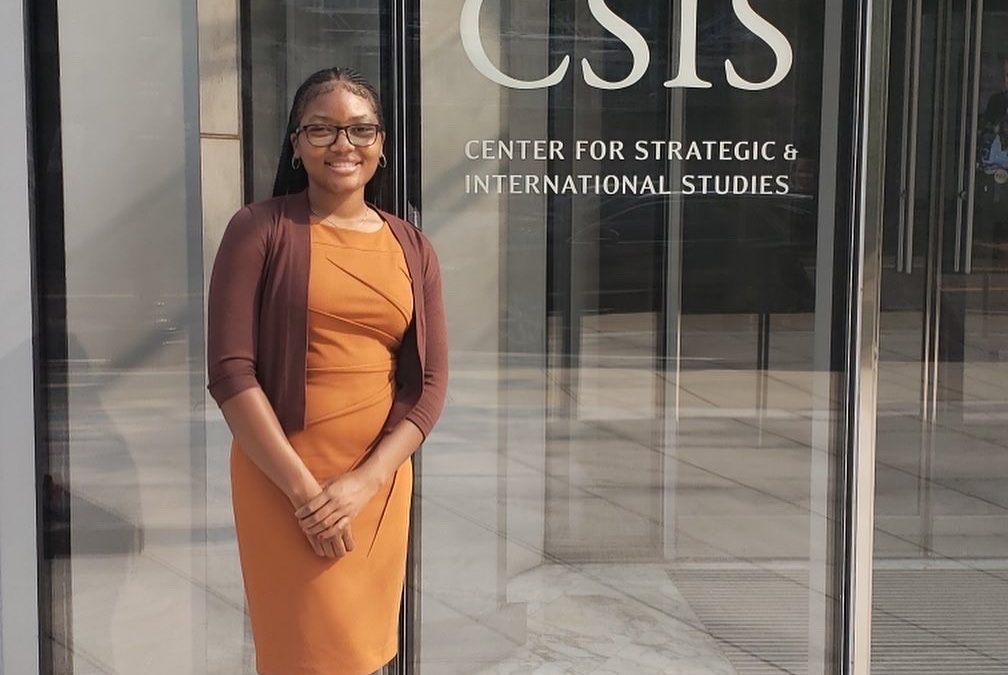
by Mohamed Elshekh | Oct 5, 2021 | Graduate Students, Internship Experiences
My name is Tajah McCray, and I am an M.A. candidate at the School of Diplomacy. In Summer 2021, I was a research intern with the Wadhwani Chair in U.S-India Policy Studies at the Center for Strategic and International Studies (CSIS). CSIS is a think tank based out of Washington D.C. and its purpose is to define the future of national security. The Wadhwani team conducts research on how the United States and India can further enhance their cooperation in areas such as defense and economic development, including promoting business engagement between the United States and India, and the environment.
While pursuing my undergraduate degree in International Relations I went on an International Service-Learning Trip to India. I stayed in India for about a month and visited the states of Andhra Pradesh and Uttar Pradesh. During my time in India, and after I returned to the United States, I knew that I wanted to continue my studies in the field of International Relations and further my knowledge of India and South Asia. That experience led me to the Diplomacy program here at Seton Hall University and the Internship with the Wadhwani Chair in U.S-India Policy Studies.
As a research intern, I had multiple tasks but two tasks that I enjoyed were tracking information regarding the COVID-19 outbreak in India and writing my own blog post to publish with CSIS. I enjoyed the research because it gave me a chance to explore the healthcare system of another state and I was exposed to different challenges India and other emerging states face regarding global health such as the lack of medical supplies and the impacts of vaccine nationalism.
I was given the freedom to write blog posts for CSIS on topics such as U.S-India relations, Indian economic reforms, innovation, and defense. While I was extremely excited about this opportunity it was challenging. The posts must be written in executive style writing which I am familiar with thanks to two classes I took here at Seton Hall which are Comparative Foreign Policy and the Statecraft of Foreign Policy. During these classes, I was tasked with writing an executive summary on U.S-Saudi Arabia relations and U.S-India relations. As a result, I felt prepared to write my blog post.
I would recommend this internship to anyone interested in learning about India or South/Southeast Asia. During my time at CSIS I covered India’s cooperation with China, Japan, Bangladesh, Myanmar, Sri Lanka and more. In addition, I expanded my knowledge on many areas related to international relations such as trade, defense, global health, and international law. I also had the opportunity to network with senior officials who are in careers that I potentially would like to enter such as becoming a Research Fellow in South Asia relations at the Heritage Foundation or entering a career in the civil service through the U.S. State Department. This internship has built my confidence and it truly was a great learning experience.
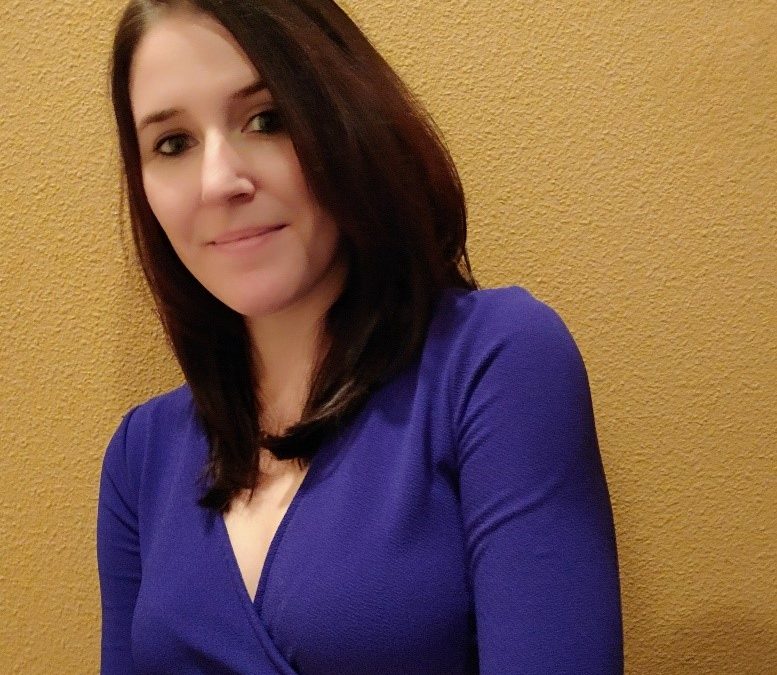
by Mohamed Elshekh | Jun 28, 2021 | Graduate Students, Internship Experiences
My name is Jocelyn Anderson and, I am a graduate student at the Seton Hall University’s School of Diplomacy and International Relations specializing in Global Negotiation & Conflict Management and International Security. I am interning at Echo Analytics Group (EAG), an Open-Source Intelligence (OSINT) research and analysis company in Tampa, Florida.
As an intern for EAG, I am learning many new skills that are important for my development as a professional and a student. Many of my projects involve social media research and other sources of publicly available information. This work is particularly useful in my academic research as my Master Research Project focuses on the spread of disinformation campaigns over social media. As technology continues to advance, social media is becoming a useful platform for state and non-state actors to engage in disinformation operations. By learning how to be an effective OSINT analyst, I can understand how these operations are structured and accurately guide my graduate research. This internship also contributes to my future career plans. I am interested in pursuing an intelligence career – specifically counterterrorism. Interning with EAG provides me with critical insights into what I must do to reach my professional goals.
Interacting with the EAG staff is one of my favorite parts of the internship experience. EAG analysts have professional experiences in the military and special forces, intelligence, and investigative journalism. The conversations I have with staff members improve my technical skills while simultaneously stimulating my intellectual curiosity. Something we often speak about at EAG is the importance of the human component in OSINT. People often forget that every text message, photo, and online engagement is an indicator of human behavior. That is, online interactions provide critical insights into an individual’s thoughts and motivations. This internship is helping me develop a new way of looking at my work through a human-centered approach that considers the behavioral aspects of social media engagements. As an intern, I also have access to the Academy Training that EAG offers. This means that along with my hands-on training, I can work on my own development through taking highly informational and beneficial courses. These courses help with how to approach scenarios as an analyst but also with the more technical aspects such as coding.
I am very grateful for my time at EAG and I hope to continue my professional relationship with them beyond this semester. I have not only learned new skills, but I have developed a different way of looking at research and intelligence gathering. I hope that through my experience with EAG, I may be able to develop even better ways to identify and disrupt disinformation campaigns and provide threat assessments that may be beneficial to U.S. interests.
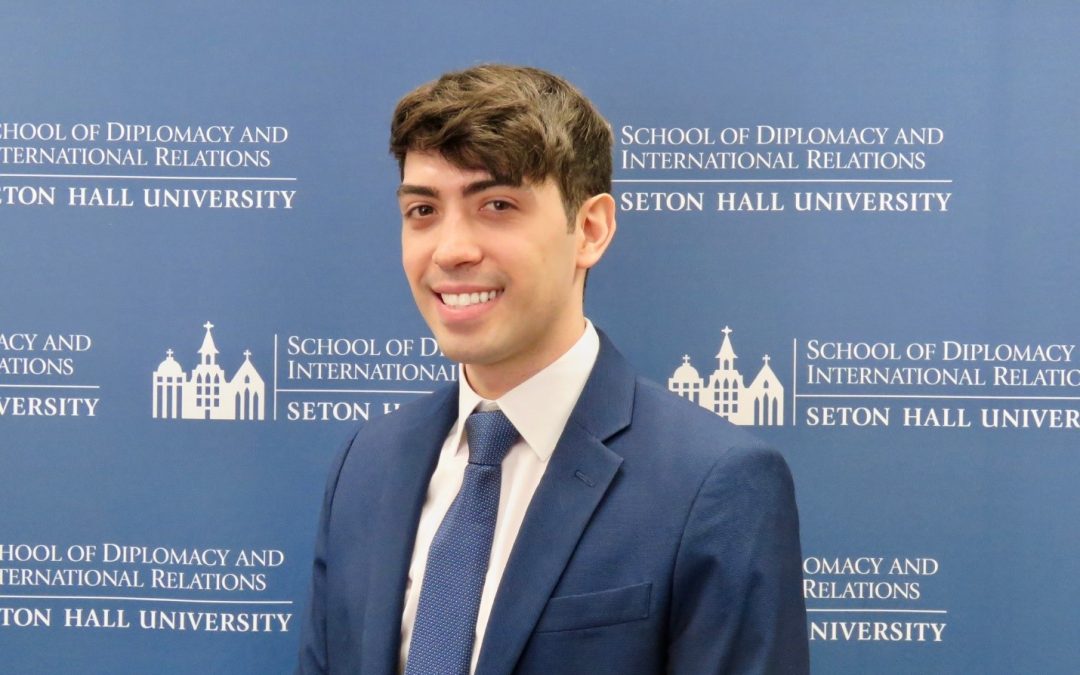
by Mohamed Elshekh | Nov 23, 2020 | Graduate Students, Internship Experiences
My name is Cristian Y. Ramos and I am in my last semester at the School of Diplomacy and International Relation’s M.A. program, specializing in International Organizations and International Law and Human Rights. I am very passionate about understanding human rights issues, particularly that of refugees and sexual violence against men and boys. My nine-month internship in the Humanitarian Office of the United Nations Population Fund (UNFPA) in New York helped me engage with my academic interests on a professional level. UNFPA is the sexual and reproductive health agency that deals with prevention and response in sexual gender-based violence (GBV), female genital mutilation (FGM), and other humanitarian priorities in 123 countries. During my time with UNFPA, I was a Policy and Liaison Intern for the humanitarian team. My duties ranged from taking notes during meetings to researching and helping the team develop innovative projects.
Some of my most meaningful projects involved doing research on sexual violence against men and boys in conflict settings and on the UN Framework on Mental Health and Psychosocial Support (MHPSS). Both projects highlighted of the need for more diverse and integrated systems to treat those suffering from mental health due to violence, human rights abuses, migration, displacement, and more recently, the effects of Covid-19. The systems that are in place to serve and treat people require that services are given to men, women, girls, boys, and the elderly without discrimination or preference. Additionally, my internship provided me with the opportunity to see diplomacy in action. During meetings with delegates and ambassadors, I experienced how my supervisors diplomatically negotiated on behalf of the agency when funds were needed to implement programs and projects at the country level.
My coursework at Seton Hall was critical to my success with UNFPA. In particular, my classes in International Human Rights and Public International Law helped me build a foundation in the discipline and understand how international organizations, like UNFPA, help advance human rights and how they can improve. My internship was incredibly transformative as it helped me acquire skills in research, diplomacy, and writing. Working at the United Nations provided me with a different set of professional skills that vary from the skills I learned in the classroom. The reports that I put together with UNFPA had to abide by a particular template, as per UN guidelines, and they needed to be written in a different style. Additionally, I learned how to conduct negotiations by observing my supervisors as well as the ambassadors and diplomats who worked with our team.
I would definitely recommend this internship to those seeking a professional environment that deals with human rights issues. UNFPA is an organization that puts theory into practice. Students will not only learn about the important issues facing the global community but will also learn the codes of conduct and culture of the United Nations.

by Mohamed Elshekh | Oct 6, 2020 | Graduate Students, Internship Experiences
My name is Priscilla Haingo Plat and I am a second-year graduate student in the School of Diplomacy & International Relations at Seton Hall University. I am originally from Madagascar and France and nearly a year ago, after moving out of Paris, I started the M.A. program offered by the School of Diplomacy. I knew such an academic endeavor would be a crucial step in the right direction to help narrow my career path, develop leadership skills, and uncover unique professional opportunities.
Among these unique opportunities was a remote internship at the Geneva Center for Security Policy (GCSP). GCSP is an international foundation focused on building and maintaining global peace, security and stability. I joined the organization in the midst of the coronavirus pandemic, assuming the role of Young Leader in Foreign and Security Policy, as part of their prestigious Global Fellowship Initiative (GFI). My graduate school specializations are global negotiation and conflict management, with a regional focus on Africa. Therefore, getting an insider’s view of a Geneva-based institution with 45 affiliated member states, which is recognized as one of the world’s leading centers for executive education, policy analysis and diplomatic dialogue, constitutes a dream internship experience for the political affairs specialist, policy analyst and diplomat that I aspire to be.
With GCSP I engaged in research, data collection, and leadership skills for activities surrounding climate change, migration, international security, foresight in Africa, conflict prevention, and the nexus between terrorism and organized crime in all its forms. Alternating between strategic anticipation and terrorism in relation to preventing violent extremism (PVE) essentially determines the work that I am doing with the Center.
A significant portion of the expertise I applied to the Center’s projects related to key security and peace policy issues that I acquired during my first year of graduate school. Courses such as Institutions of Post-Conflict Governance, Peacemaking and Peacekeeping, and the Art and Science of Negotiation, as well as various on-campus event organized by the School of Diplomacy, undoubtedly sharpened my knowledge and analytical thinking on foreign policy and international security.
Given the circumstances, performing remotely and coordinating with my colleagues who are based in Geneva, has caused me to develop more effective reporting methods and rearrange my daily schedule, keeping in mind that time difference is a challenge that has to be overcome in order to meet deadlines and reach individual, collective, and global objectives.
Not only does this fellowship program provide its participants with executive courses, conferences, seminars, workshops and the chance to participate in regional or issue-specific collaborative designs, but it also offers exclusive networking connections; notably, GCSP’s experts, executives-in-residence, associates, and doctoral and government fellows. I would highly recommend any student majoring in international relations apply and make the most of this fellowship program in the pursuit of a thriving career.
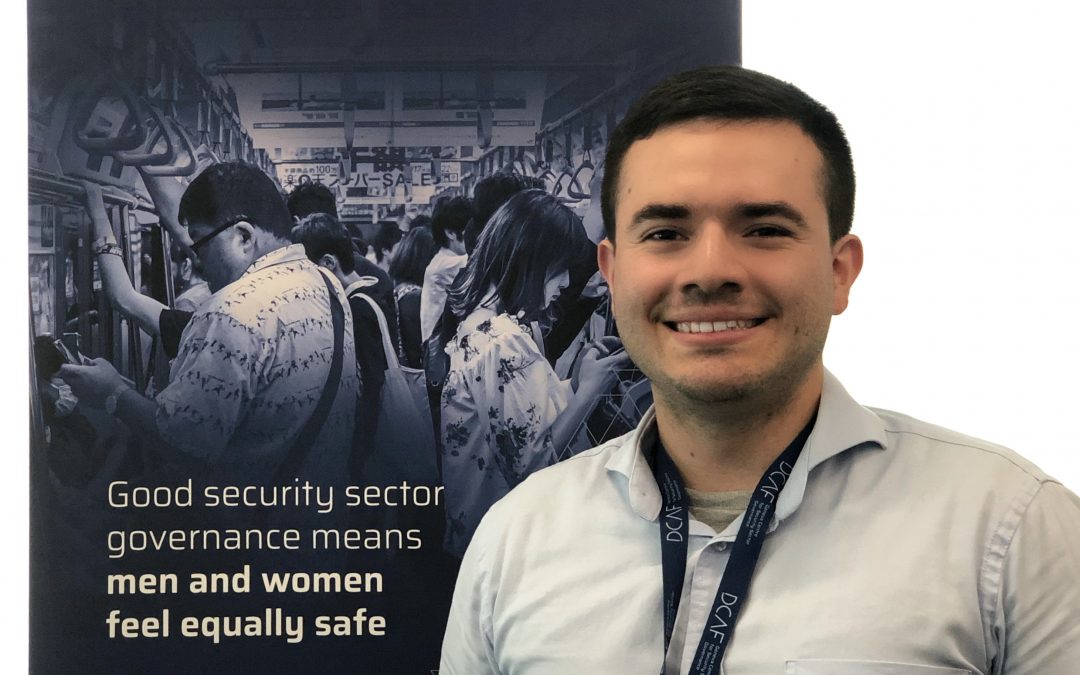
by Madison McHugh | Aug 28, 2019 | Graduate Students, Internship Experiences
My name is Emanuel Hernandez. I am a second-year graduate student pursuing an M.B.A. in Supply Chain Management/M.A. in International Relations dual-degree program at Seton Hall University. In the summer, I was selected as the School of Diplomacy’s Sergio Vieira de Mello Fellow, a fellowship program created in honor of a Brazilian UN diplomat who was killed in a bombing while working as the UN Secretary-General’s Special Representative in Iraq.
De Mello fellows are placed as research assistants in project-based work at the DCAF – Geneva Centre for Security Sector Governance for a duration of eight weeks. DCAF, an international foundation under Swiss law, is dedicated to improving the security of states and their populations within a framework of democratic governance, the rule of law, and respect for human rights. DCAF helps its partner states and international actors to improve the governance of their security sectors through inclusive and participatory reforms based on international standards and practices. The foundation currently has 63 member states and operations in more than 74 countries.
I interned for the Latin America & Caribbean (LAC) Unit within the Operations Department. As one of the newest units at DCAF, we had a small team, with only a head of division, two project coordinators, one financial officer, and two interns (including myself). Working in such a small team comes with both challenges and perks.
One of the main advantages of working in a small team was the one-on-one feedback and mentoring from my peers. We worked in a dynamic environment that required everyone in the team to be able to perform multiple tasks. During my time there, I prepared multiple research reports and concept notes to be used in funding proposals, translated and edited publications and legal documents for international cooperation projects, and prepared daily briefs on security sector news in DCAF’s focus countries in LAC. I also had the opportunity to improve my professional writing skills in Spanish.
However, being responsible for multiple tasks in a small team came with its own challenges. Sometimes, the workload exceeded the time available in a given day, so I needed to learn how to prioritize tasks effectively to make sure that I got everything accomplished at the right time.
Participating in the internship reassured me of my choice to pursue a dual-degree program. My background in international relations was essential for processing data, understanding complex issues, and delivering information concisely in research reports. My education in business administration, on the other hand, was particularly useful in understanding financial statements and legal documents needed to implement and monitor international projects. I would certainly recommend this internship to anyone that is interested in international project-based work.
Geneva is a vibrant city during the Summer, and DCAF is located at the heart of international Geneva. While my objective had always been to work in the New York/Washington area, this experience opened my eyes to the professional opportunities in Geneva, which serves as a hub for hundreds of international organizations, multinational companies, and non-governmental organizations. Based on my experience with DCAF, I will be keeping an eye on jobs in Geneva when I begin applying for full-time positions.








